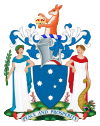Members of the Victorian Legislative Council, 1851–1853
This is a list of members of the Victorian Legislative Council, as appointed to the inaugural Council of 1851 or elected at the .
From 1851 to 1856 the original Legislative Council was unicameral (a single chamber) and consisted of Electoral districts.[1] From 1856 onwards, the Victorian parliament consisted of two houses, the Victorian Legislative Council (upper house, consisting of Provinces) and the Victorian Legislative Assembly (lower house).[2]

Victorian Legislative Council districts 1851-54
| Name | Type | Electoral district[1] (or office) | Term of Office |
|---|---|---|---|
| Redmond Barry[a] | office-bearing nominee | (Solicitor-General) | 1851–1852 |
| William Campbell | elected | Loddon | 1851–1854, 1862–1882 |
| Charles Dight[b] | elected | North Bourke | 1851–1852 |
| Alexander Dunlop[c] | nominee | — |
1851–1852 |
| Charles Ebden[d] | office-bearing nominee | (Auditor-General) | 1851–1852 |
| John Fawkner | elected | Talbot, Dalhousie and Angelsey | 1851–1869 |
| Adolphus Goldsmith | elected | Ripon, Hampden, Grenville and Polwarth | 1851–1853 |
| Charles Griffith[e] | nominee | — |
1851–1852, 1853–1856 |
| William Haines[f] | nominee | — |
1851–1852, 1853–1856, 1865–1866 |
| James Johnston[g] | elected | City of Melbourne | 1851–1852 |
| William Lonsdale | office-bearing nominee | (Colonial Secretary) | 1851–1853 |
| John Mercer[h] | elected | Grant | 1851–1852 |
| Henry Miller | elected | South Bourke, Evelyn and Mornington | 1851–1866 |
| Francis Murphy | elected | Murray | 1851–1853, 1853–1856, 1872–1876 |
| Thomas Osborne[i] | elected | Belfast and Warrnambool | 1851–1852 |
| John O'Shanassy | elected | City of Melbourne | 1851–1856, 1868–1874 |
| James Palmer | elected | Normanby, Dundas and Follett | 1851–1870 |
| Robert Pohlman | office-bearing nominee | (Master in Equity) | 1851–1854, 1855–1856 |
| Robert Robinson[j] | elected | Geelong | 1851–1852 |
| James Ross[k] | nominee | — |
1851–1852 |
| Andrew Russell | nominee | — |
1851–1856 |
| William Rutledge | elected | Villiers and Heytesbury | 1851–1854 |
| John Smith | elected | North Bourke | 1851–1856 |
| Peter Snodgrass | elected | Kilmore, Kyneton and Seymour | 1851–1856 |
| William Splatt | elected | Wimmera | 1851–1854 |
| William Stawell | office-bearing nominee | (Attorney-General) | 1851–1856 |
| James Strachan | elected | Geelong | 1851–1866, 1866–1874 |
| Robert Turnbull | elected | Gipps' Land | 1851–1853, 1864–1872 |
| William Westgarth | elected | City of Melbourne | 1851–1853 |
| Thomas Wilkinson | elected | Portland | 1851–1856 |
- a Redmond Barry resigned June 1852, replaced as Solicitor-General from 13 April 1852 by Edward Williams.[3] Williams was replaced by James Croke from 21 July 1852.[3]
- b Dight died 9 October 1852, replaced by William Nicholson, by-election November 1852
- c Dunlop died 21 June 1852, replaced by Joseph Anderson on 14 July 1852[4][5]
- d Ebden resigned October 1852, replaced by Hugh Childers, from 26 October 1852.[4][6]
- e Griffith resigned June 1852, replaced by John Riddell on 21 June 1852[5]
- f Haines resigned August 1852, replaced by Archibald Michie on 26 October 1852[7]
- g Johnston resigned December 1852; replaced by Augustus Greeves, by-election January 1853
- h Mercer resigned December 1852; replaced by John Myles, by-election December 1852
- i Osborne resigned December 1852; replaced by Lauchlan Mackinnon, by-election December 1852
- j Robinson died 14 May 1852; replaced by Alexander Thomson, by-election June 1852
- k Ross resigned July 1852, replaced by Thomas Turner à Beckett, nominee, from 14 July 1852[4][5]
References[]
- ^ a b "Victorian Electoral Act" (PDF). New South Wales Government. 1851. Retrieved 17 May 2013.
- ^ Sweetman, Edward (1920). Constitutional Development of Victoria, 1851-6. Whitcombe & Tombs Limited. p. 182. Retrieved 17 May 2013.
- ^ a b "Statistical Register of the State of Victoria" (PDF). 1908.
- ^ a b c Labilliere, Francis Peter (1878). "Early History of the Colony of Victoria". Retrieved 25 June 2014.
- ^ a b c Sweetman 1920, p.169
- ^ "Childers, Hugh Culling Eardley". Parliament of Victoria.
- ^ Sweetman 1920, p.170
- "Re-Member (Former Members)". Parliament of Victoria. Retrieved 17 June 2021.
Categories:
- Members of the Parliament of Victoria by term
- 19th-century Australian politicians
